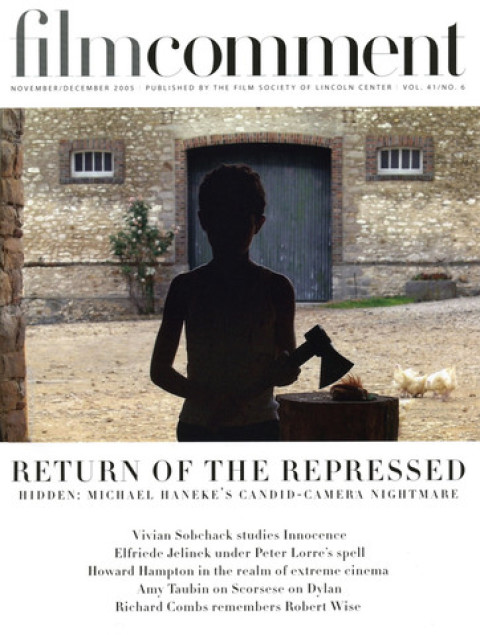
Sometime in the early Nineties our curators of cool inducted Johnny Cash into the proto-gangsta pantheon of Great American Badasses. A ferocious 1970 photo of him flipping a cameraman the bird started appearing everywhere (I had one in my cubicle next to an Ice Cube malt-liquor ad), and rap impresario Rick Rubin began his decade-plus recasting of Cash as the eternal mystic outlaw—releasing four spare treatments of that timeless baritone doing songs both old and postmodern, all skewing to themes of, as one album title put it, “Love, God, and Murder.”
That’s the Cash aura that infuses the beginning of the latest big-budget treatment of a music giant, Walk the Line, which opens with an exterior prison shot and the title “Represa, California, 1968.” The site and date are familiar to any casual consumer of the Cash myth, and as the camera begins its slow journey inside—dollying through empty cells and abandoned corridors—the distant rumble of the event crescendos with the historical sweep of a Nuremberg doc. Clapping hands and stomping boots build the peppy two-step onstage to riotous tension as inmates await the Man in Black’s legendary concert in Folsom Prison, a live album that eventually outsold The Beatles. In a quiet room offstage, we meet Joaquin Phoenix’s Cash, sitting with dark eyes fixed on a table saw as a glass of water shakes rhythmically as if from thuds of an approaching Jurassic Park dinosaur. “Mr. Cash?” a voice asks as the star absently fingers the blades, lost in a reverie whose flashback narrative will comprise most of the film: farm boy falls in love with music, suffers familial deprivations, finds voice, becomes star, gets wasted, wins love, attains peace. It’s a tidy Hollywood arc imposed on a messy real life, but it gets the job done.

Since Walk the Line has been in the works for eight years, its arrival on the heels of Ray isn’t as cynically train-jumping as it might seem, although both films show the methodology for Great American Voice tales refined to a slick science. Like Ray’s Taylor Hackford, writer-director James Mangold winds selected events around sturdy themes like struggle, reconciliation, and redemption in an effort to evoke a period as much as a person—letting the aqua hues of ’55 Chevys, the fairy-tale scrim of roadside dust, and the vivid blue-black of pompadours do most of the re-creating, leaving reality to actors and story.
As Ray Charles, Jamie Foxx was simply uncanny, an act of flawless mimicry. Joaquin Phoenix and Reese Witherspoon hoe their ambitious rows as Cash and June Carter—doing their own singing, playing, and Southern accents—but the characterizations are less about mannerisms than emotional storytelling. Witherspoon’s bubbly twang brings the brassy former child country star and future Mrs. Cash into adorable reality, while Phoenix’s scarily brooding Goth affect occasionally makes it seem like he wandered in from a remake of In Cold Blood. His obsidian stare recalls Eminem in 8 Mile more than any country figure, but you can’t say it doesn’t fit the material. As with Ray Charles, a Johnny Cash story without drugs and darkness is an E! Network biography, not a motion picture. But this film uses Cash’s demons judiciously, if Oprah-ishly, as tests for a spiritual struggle. Stationed with the air force in Germany, a lonesome Cash reads an article about Folsom Prison and is soon sitting in an empty hangar with a guitar, testing out chords and phrases. “I hear that train a comin’, a comin’ down the line,” he sings softly. “Killed a man in Reno. Just to … watch him … die?” Hmmm. The young God-fearing man smiles at the perverse line that just popped out of his unconscious and will soon make history. He comes home, wins a record contract, and stumbles through fame, drugs, infidelity, and self-hatred, along with the sounds and legends of early rock ’n’ roll—eventually finding that the same shadows that made his music are threatening his soul. The cozy epilogue—marriage to June and rapprochement with Dad—soften the tougher-minded central story, which is about a man who won the hearts of America by portraying its rejected. Few genres give you as much bang for your buck as the musical-legend biopic, which comes with blockbuster plot points and no onus of establishing believability, every potentially mawkish scene validated by the imprimatur of Reality. When the subject is Johnny Cash, though, myth is almost as important.








